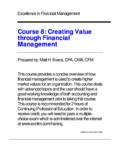Transcription of Twenty Questions You Will Be Asked By Venture …
1 Twenty Questions You will Be Asked By Venture capitalists (If You Get That Far) Abbreviated Version By Laurence K. Hayward 2009 VentureLab, Inc. All rights reserved. Preview: The primary difference between the game "20 Questions " and the Venture capital interview is that you, the interviewee, don't get to answer the Questions with a simple "yes" or "no." This document is a 5-page summary available for free downloading and distribution. The full, 15-page article may be obtained by contacting VentureLab. Article: Most likely you've played the game 20 Questions ." As the contestant, you use your best combination of Questions , which can be answered with a simple "yes" or no," in order to discover a piece of information held secret by the other player. The objective is to discover the unknown information with the fewest Questions (from the 20 you're allotted), as quickly as possible.
2 This game shares some common traits with a Venture capital interview. As the interviewee, you can expect a barrage of Questions . You might also feel like the interviewers are trying to box you in as they narrow the choices, in order to hone in on the "answer" as quickly as possible. Recognizing that Venture capitalists reject a far greater number of deals than they accept, the quickest way for this interviewer to finish the game is to find a fatal flaw, a deal-killer, a quick no. So, if they reach the twentieth question , you're doing fairly well. The primary difference between the game 20 Questions " and the Venture capital interview is that you, the interviewee, don t get to answer the Questions with a simple "yes" or "no." So, in order to help you prepare, outlined below are 20 Questions that Venture capitalists most frequently ask entrepreneurs. Following each, I've included a brief explanation regarding what the Venture capitalist (VC) might be trying to uncover.
3 These Questions aren't necessarily in the order you would receive them, though the winnowing process was taken into consideration when creating this list. 1. What is the market potential for your company's product or service? What is the revenue potential for the industry, and what is its growth rate? The VC wants to quickly ascertain whether the opportunity is large enough to pursue. What determines if the opportunity is large enough? Typically, it hinges on whether the VC will be able to achieve a healthy return within the designated timeframe (often three to five years). While all firms have different investment criteria, most VCs target a minimum return on investment (ROI) of 25 percent, or often even higher than 50 percent. To reach these thresholds, VCs look for companies with considerable market potential for their products or services (often $500 million, $1 billion or more).
4 Investors prefer growing markets to retrenching ones. Also, many VCs focus on specific industries, so they'll be trying to ascertain whether this deal is within their bailiwick. 2. How did you calculate market potential? How do you determine industry sales and growth rate? It is all too common for entrepreneurs to include very large market potential figures in their business plans and then indicate that they require only a miniscule fraction ( one percent) of the market to achieve their projections. These figures are often very suspect. Further, VCs often prefer opportunities that capture a larger fraction of the market, else the real value seems questionable and weak, relative to the competition. Market potential should be verified by independent research as well as bottom-up or top-down calculations. 3. What makes your business different or unique? This question can have two wrong answers.
5 That's because a business can be both too common and too unique for a particular investor. If it's too common, the VC will be concerned with the competition and the lifecycle of the business. If it's too unique, the VC might be concerned with the time required to achieve critical mass. Many truly revolutionary products require educating the marketplace, and that can be an uncertain and lengthy undertaking. 4. Why would someone be "compelled" to purchase your product or service? What specific needs does it address? Venture capitalists look for businesses with products or services that address a demonstrable market need or demand. Is your product something the buyer needs? Or is it just something that would be nice to have? If it falls in the latter category, then it is critical to demonstrate how your product will gain traction, that is, how people will come to demand it based on market trends.
6 5. How do you know that your business has high-growth potential? Venture capitalists want to know how you "drew down" your revenue estimates from the market potential figures (which hopefully include estimates from external sources). Ultimately, they want to see a large growth opportunity that scales quickly, thereby allowing them to realize the payoff on their investment as soon as possible. Be prepared to explain in detail the process you used to estimate revenues from market potential. 6. What is it about your management team that makes them uniquely capable of executing on this business plan? You've probably heard that the three most important items in private equity investing are management, management and management. More specifically, VCs are typically looking for management with experience in building a business, experience in the industry (or with the product) and strong character.
7 What comprises the latter? VCs look for managers who demonstrate high energy or passion, resourcefulness, integrity, perseverance, risk-taking ability and mental horsepower. Also, a frequently overlooked quality is that of humility --for example, sometimes founders may need to step aside and let someone with more experience lead the company. 7. What are the primary risks facing this opportunity? Most people tend to think of "the competition" when people ask them about risks facing their business opportunity. However, competition is only one risk. Other risks include changes or 2009 VentureLab, Inc. All rights reserved. 2shifts in technology, governmental and regulatory policies, labor market conditions (availability to find qualified labor at a reasonable cost), business climate changes, product liability, computer crime, etc. And, don't forget financial risks. For example, what happens if your current capital doesn't allow you to reach breakeven or your next financing event?
8 A risk assessment of potential threats to your business can help you prepare for the scrutiny of investors. 8. Who are your competitors? You've heard the warning "never say never." When answering the above question , the warning might well be "never say none." There is more to this question than may first be evident. Certainly, VCs are interested in learning about the extent of competition your business will encounter and how you will distinguish your company. But, they also might be assessing your maturity as a businessperson. The answer "none" is typically incorrect because your business almost always has at least two competitors. Potential buyers could simply continue to function without your product ( through the use of a substitute, however less effective) or buyers could "do nothing" ( choose not to utilize the product or service). Furthermore, if the investor is aware of competitors that you have not considered (as many have researched particular segments independently), he or she will lose faith in your business assessment skills --so be prepared.
9 9. What gives your company a competitive advantage? Venture capitalists want to know how you plan to outmaneuver the competition --and this doesn't just pertain to existing competitors. They want to see that you've given thought to future market entrants and how you will stave them off. "First-mover advantage" is rarely a sufficient response to this question . A more effective answer usually depicts intellectual property barriers or the ability to reach the target market in a way more effective than the competition. What is unique about your company that gives it an edge? 10. Does the company have proprietary intellectual property in the form of patent, trademarks, copyrights, What do you own? What can you protect? These are two important Questions on the mind of any VC. In some industries ( biotech), patents play a critical role in protecting the research and development investments of the company and in helping to ensure that there is a window of opportunity (usually before competitor offerings arrive) for the company to realize a significant share of revenues for a particular category.
10 Trademarks and copyrights are critical to protecting the company's intellectual assets and its "brand." Also, at some point, VCs will also want to ensure that you've taken the proper steps (through non-disclosure agreements, non-competes, and/or employment agreements) to ensure that the company is protecting its intellectual capital. 11. When will your company break even in terms of profitability and cash flow? Remember when you first became financially independent of your parents? Hopefully, you were at a point where your income exceeded your expenses and you no longer required their support. The concept here is similar. Once you're financially independent, you're also less of a liability. Of course, the ultimate goal is to reach an exit scenario quickly. Profitable businesses are more attractive to potential buyers or public markets. 2009 VentureLab, Inc. All rights reserved.






